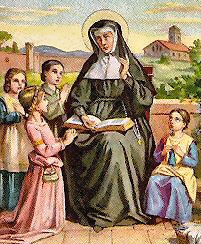January 27, 2014
Monday of the Third Week in Ordinary Time
All the tribes of Israel came to David in Hebron and said:
“Here we are, your bone and your flesh.
In days past, when Saul was our king,
it was you who led the children of Israel out and brought them back.
And the LORD said to you, ‘You shall shepherd my people Israel
and shall be commander of Israel.’”
When all the elders of Israel came to David in Hebron,
King David made an agreement with them there before the LORD,
and they anointed him king of Israel.
David was thirty years old when he became king,
and he reigned for forty years:
seven years and six months in Hebron over Judah,
and thirty-three years in Jerusalem
over all Israel and Judah.
Then the king and his men set out for Jerusalem
against the Jebusites who inhabited the region.
David was told, “You cannot enter here:
the blind and the lame will drive you away!”
which was their way of saying, “David cannot enter here.”
But David did take the stronghold of Zion, which is the City of David.
David grew steadily more powerful,
for the LORD of hosts was with him.
R. (25a) My faithfulness and my mercy shall be with him.
Once you spoke in a vision,
and to your faithful ones you said:
“On a champion I have placed a crown;
over the people I have set a youth.”
R. My faithfulness and my mercy shall be with him.
“I have found David, my servant;
with my holy oil I have anointed him,
That my hand may be always with him,
and that my arm may make him strong.”
R. My faithfulness and my mercy shall be with him.
“My faithfulness and my mercy shall be with him,
and through my name shall his horn be exalted.
I will set his hand upon the sea,
his right hand upon the rivers.”
R. My faithfulness and my mercy shall be with him.
The scribes who had come from Jerusalem said of Jesus,
“He is possessed by Beelzebul,” and
“By the prince of demons he drives out demons.”
Summoning them, he began to speak to them in parables,
“How can Satan drive out Satan?
If a kingdom is divided against itself, that kingdom cannot stand.
And if a house is divided against itself,
that house will not be able to stand.
And if Satan has risen up against himself and is divided,
he cannot stand;
that is the end of him.
But no one can enter a strong man’s house to plunder his property
unless he first ties up the strong man.
Then he can plunder his house.
Amen, I say to you, all sins and all blasphemies
that people utter will be forgiven them.
But whoever blasphemes against the Holy Spirit
will never have forgiveness,
but is guilty of an everlasting sin.”
For they had said, “He has an unclean spirit.”
22. And the Scribes which came down from Jerusalem said, He has Beelzebub, and by the prince of the devils casts he out devils.
BEDE; The Scribes also coming down from Jerusalem blaspheme. But the multitude from Jerusalem, and from other regions of Judea, or of the Gentiles, followed the Lord, because so it was to be at the time of His Passion, that a crowd of the people of the Jews should lead Him to Jerusalem with palms and praises, and the Gentiles should desire to see Him; but the Scribes and Pharisees should plot together for His death.
23. And he called them to him, and said to them in parables, How can Satan cast out Satan?
24. And if a kingdom be divided against itself, that kingdom cannot stand.
25. And if a house be divided against itself, that house cannot stand.
26. And if Satan rise up against himself, and be divided, he cannot stand, but has an end.
27. No man can enter into a strong man's house, and spoil his goods, except he will first bind the strong man; and then he will spoil his house.
28. Verily I say to you, All sins shall be forgiven to the sons of men, and blasphemies wherewith soever they shall blaspheme:
29. But he that shall blaspheme against the Holy Ghost has never forgiveness, but is in danger of eternal damnation:
30. Because they said, He has an unclean spirit.
PSEUD-CHRYS. The blasphemy of the Scribes having been detailed, our Lord shows that what they said was impossible confirming His proof by an example. Wherefore it says And having called them together to him, He said to them in parables, How can Satan, cast out Satan?
As if He had said, A kingdom divided against itself by civil war must be desolated, which is exemplified both in a house and in a city. Wherefore also if Satan's kingdom be divided against itself, so that Satan expels Satan from men, the desolation of the kingdom of the devils is at hand. But their kingdom consists in keeping men under their dominion. If therefore they are driven away from men, it amounts to nothing less than the dissolution of their kingdom. But if they still hold their power over men, it is manifest that the kingdom of evil is still standing, and Satan is not divided against himself.
GLOSS. And because He has already shown by an example that a devil cannot cast out a devil, He shows how he can be expelled, saying,
No man can enter into a strong man's house, &c.
THEOPHYL. The meaning of the example is this: The devil is the strong man; his goods are the men into whom he is received; unless therefore a man first conquers the devil, how can he deprive him of his goods, that is, of the men whom he has possessed? So also I who spoil his goods, that is, free men from suffering by his possession, first spoil the devils and vanquish them, and am their enemy. How then can you say that I have Beelzebub, and that being the friend of the devils, I cast them out?
BEDE; The Lord has also bound the strong man, that is, the devil: which means, he has restrained him from seducing the elect, and entering into his house, the world; The has spoiled his house , and his goods, that is men, because He has snatched them from the snares of the devil, and has united them to His Church. Or, He has spoiled his house, because the four parts of the world, over which the old enemy had sway, He has distributed to the Apostles and their successors, that they may convert the people to the way of life.
But the Lord shows that they committed a great sin, in crying out that that which they knew to be of God, was of the devil, when He subjoins, Verily I say to you, All sins are forgiven, &c. All sins and blasphemies are not indeed remitted to all men, but to those who have gone through a repentance in this life sufficient for their sins; thus neither is Novatus right, who denied that any pardon should be granted to penitents, who had lapsed in time of martyrdom; nor Origen, who asserts that after the general judgment, after the revolution of ages, all sinners will receive pardon for their sins, which error the following words of the Lord condemn, when He adds, But he that shall blaspheme against the Holy Ghost, &c.
PSEUD-CHRYS. He says indeed, that blasphemy concerning Himself was pardonable, because He then seemed to be a man despised and of the most lowly birth, but, that contumely against God has no remission. Now blasphemy against the Holy Ghost is against God, for the operation of the Holy Ghost is the kingdom of God; and for this reason, He says, that blasphemy against the Holy Ghost cannot be remitted. Instead, however, of what is here added, But will be in danger of eternal damnation, another Evangelist says, Neither in this world, nor in the world to come. By which is understood, the judgment which is according to the law, and that which is to come. For the law orders one who blasphemes God to be slain, and in the judgment of the second law he has no remission. However, he who is baptized is taken out of this world; but the Jews were ignorant of the remission which takes place in baptism. He therefore who refers to the devil miracles, and the casting out of devils which belong to the Holy Ghost alone, has no room left him for remission of his blasphemy.
Neither does it appear that such a blasphemy as this is remitted, since it is against the Holy Ghost. Wherefore he adds, explaining it, Because they said, He has an unclean spirit.
THEOPHYL. We must however understand, that they will not obtain pardon unless they repent. But since it was at the flesh of Christ that they were offended, even though they did not repent, some excuse was allowed them, and they obtained some remission.
PSEUDO-JEROME; Or this is meant; that he will not deserve to work out repentance, so as to be accepted, who, understanding who Christ was, declared that He was the prince of the devils.
BEDE; Neither however are those, who do not believe the Holy Spirit to be God, guilty of an unpardonable blasphemy, because they were persuaded to do this by human ignorance, not by devilish malice.
AUG. Or else impenitence itself is the blasphemy against the Holy Ghost which has no remission. For either in his thought or by his tongue, he speaks a word against the Holy Ghost, the forgiver of sins, who treasures up for himself an impenitent heart. But He subjoins, Because they said, He has an unclean spirit, that he might show that His reason for saying it, was their declaring that He cast out a devil by Beelzebub, not because there is a blasphemy, which cannot be remitted, since even this might be remitted through a right repentance; but the cause why this sentence was put forth by the Lord, after mentioning the unclean spirit, (who as our Lord shows was divided against himself,) was, that the Holy Ghost even makes those whom He brings together undivided, by His remitting those sins, which divided them from Himself, which gift of remission is resisted by no one, but him who has the hardiness of an impenitent heart. For in another place, the Jews said of the Lord, that He had a devil, without however His saying anything there about the blasphemy against the Spirit; and the reason is, that they did not there cast in His teeth the unclean spirit, in such a way, that that spirit could by their own words be shown to be divided against Himself, as Beelzebub was here shown to be, by their saying, that it might be he who cast out devils.
Catena Aurea Mark 3



